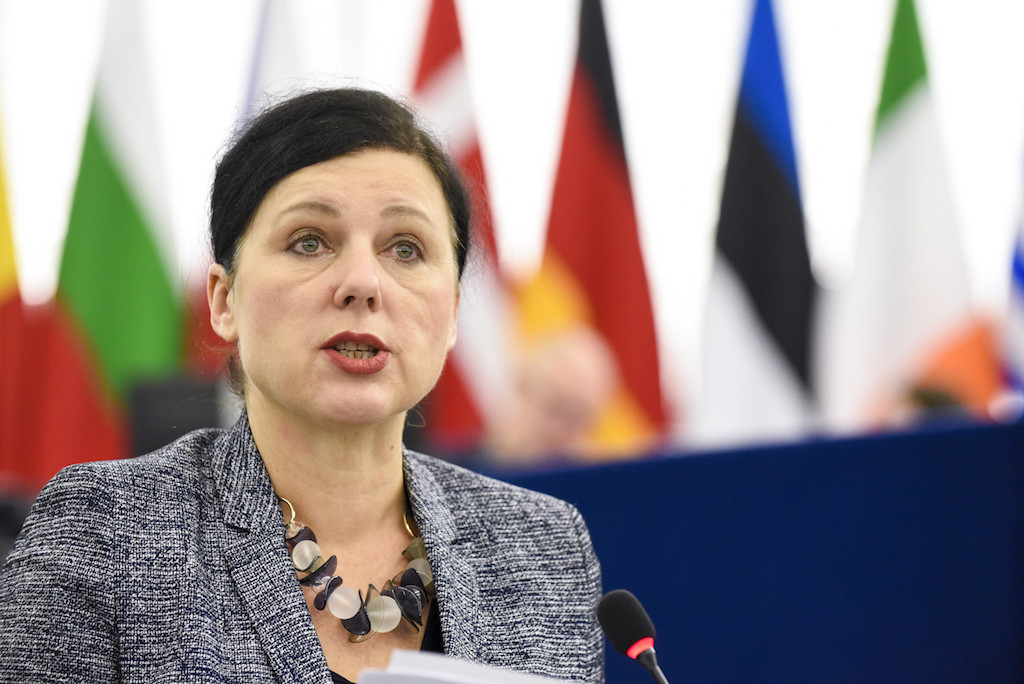EU governments cannot treat next year’s European parliamentary elections as “business as usual” given the growing risk of foreign and corporate manipulation, according to the European commission.
The scandal over the misuse of Facebook data by Cambridge Analytica and the growing evidence of illegal interference in elections were described by the commission as a “wake-up call” to which national governments had to respond.
Věra Jourová, the justice commissioner, told the European parliament that a “digital arms race” was in play and that it could pose a serious threat for free and democratic elections.
The commission is urging EU governments to establish a pan-European network to monitor electoral campaigning on social media and rest of the internet. The commission wants the member states to work together to impose rules and regulations governing offline campaigning to be applied to the digital world.
The move follows the scandal first reported by the Observer of the harvesting and sharing of the personal data of tens of millions of people by Cambridge Analytica. Facebook has admitted that the data of 87 million users may have been improperly shared, including that of 1 million users in the UK.
Jourová said the scandal offered a “clear warning sign” that election periods were particularly prone to disinformation and manipulation by private and foreign interests and that next May’s European elections were not immune to the threat.
The campaign for that poll are expected to be dominated by a clash between those promoting the nationalist and anti-immigration policies of Italy’s interior minister, Matteo Salvini, and Hungary’s prime minister, Viktor Orbán, and those backing a pro-European agenda, led by the French president, Emmanuel Macron.
Donald Trump’s former chief strategist Steve Bannon is seeking to create a large far-right bloc in the European parliament. Cambridge Analytica executives boasted of playing a key role in bringing Trump to power.
Electoral habits from non-digital past
Jourová said: “Our current electoral rules, practices and habits stem from our non-digital past, [such as] campaign spending limits, strict rules on [political] advertising, including transparency on who is campaigning and who paid for this.”
The Oxford Internet Institute, part of the University of Oxford, published a report this year that found evidence of formally organised social media manipulation campaigns in 48 countries, up from 28 in the previous year.
Jourová, who is a politician from the Czech Republic, said: “One thing is clear: the upcoming elections will not be business as usual and we cannot treat them as if they were.”
The commission recently published an EU-wide code of practice on disinformation to encourage social media sites to limit the “micro-targeting” of voters and to make the funding of such campaigns more transparent to users.
It also wants support for an independent network of fact-checkers and action to stimulate quality journalism and promote media literacy.
Julian King, the security commissioner, said internet platforms such as Twitter and Facebook had a responsibility to defend the integrity of elections by “shining a light” on the sources of information on their sites.
He said: “The Cambridge Analytica case has thrust into the spotlight an array of threats to our elections: hacks, leaks, fake news, as well as the misuse of personal data.”
King said the code of practice established by the commission for internet platforms was voluntary but that legislation in the future had not been ruled out if results did not follow.
He and Jourová were taking part in a debate in the European parliament before a vote on Thursday on whether to back measures such as a full audit of Facebook or changes to its platform to avoid future privacy violations.
Conservative MEP Dan Dalton said the results in recent contentious polls should not be blamed on digital manipulation alone.
“Brexit and Trump happened because many felt the political system was not working for them,” he said. “Claiming the voters were duped by posts on Facebook is merely an excuse for not addressing those very legitimate concerns.”
By Daniel Boffey in Strasbourg
